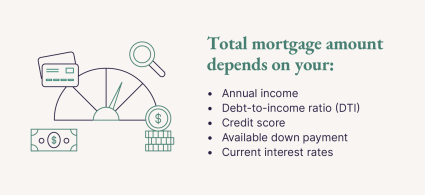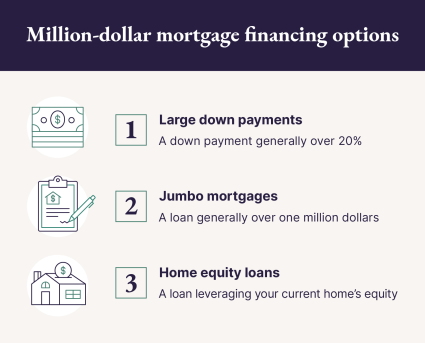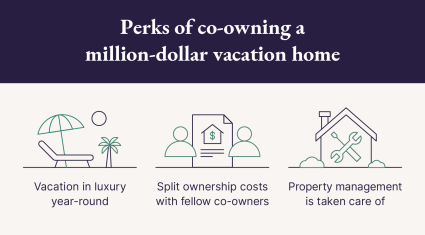What annual salary do you need to afford a million-dollar house?
To comfortably afford a home valued at $1 million, financial experts recommend an annual salary between $269,000 and $366,000. This range, however, is subject to variation depending on your:- Annual income
- Debt-to-income ratio (DTI)
- Credit score
- Available down payment
- Current interest rates

| Example: If you put down 20% ($200,000) and have few monthly expenses, you can likely secure a mortgage with a good interest rate (say, a 30-year fixed-rate mortgage at 7%). This would bring your monthly mortgage payment to about $5,300 before factoring in property taxes and homeowners insurance. |
Expected and unexpected expenses of owning a million-dollar home
It’s important to plan for expenses beyond the mortgage. Here are a few things to factor in: mortgage insurance, property taxes and possible HOA fees.Although mortgage insurance isn’t always necessary, your lender may require it if you supply a low down payment. If you put less than 20% down on a home, most lenders require private mortgage insurance (PMI). This can cost over 1% of the value of your loan. If you put down $200,000, you would likely need to pay an additional $375 monthly for PMI. Property taxes are also an important factor to consider. Rates are set by local jurisdictions so check with your real estate agent. The average national property tax rate is about 1%, so an extra $10,000 per year, or $833 per month, for a million-dollar home. If your neighborhood has a homeowners association (HOA), you’ll be charged monthly HOA fees on top of your mortgage. HOAs have additional regulations and codes agreed upon by neighbors. You may also need to seek approval for certain projects or renovations.In addition to the expense above, consider the cost of- Home and yard maintenance
- Homeowners insurance
- Possible property management
Tax implications of a million-dollar home
You might not anticipate how your new home will affect your income taxes. For example, you can lose potential tax savings if your mortgage interest exceeds the current deduction threshold.The mortgage interest tax deduction has a limit of $750,000, which means that if you put down less than $250,000, you will incur “lost” tax savings each year until your principal loan balance drops below $750,000.If you decide to rent out your $1 million second home, you won’t be able to claim the mortgage interest deduction, but you could end up with tax-free rental income due to the various deductions for landlords. However, this can be a complicated adjustment, and finding renters and managing a rental — or short-term rental property — can be a hassle.Financing strategies: How to buy a million-dollar house
Financing a mortgage on a million-dollar home doesn’t have to be stressful. In fact, there are three financing strategies available for those who have the income for a million-dollar home.
Large down payments
Paying a larger down payment upfront can help you minimize the amount of interest you’ll pay on your principal. Although 20% is generally expected by lenders, providing more can help make your bid more competitive and potentially lower your mortgage payments.Jumbo mortgages
If your home’s price exceeds the conventional loan limits set by your state — generally over one million dollars — you may require financing via a jumbo loan. These non-conforming loans may require a down payment of as little as 5% and are not subject to limits set by Fannie Mae or Freddie Mac. Check with your county and lender to see if you qualify for a jumbo mortgage.Home equity loans
A home equity loan and a home equity line of credit (HELOC) may help current homeowners pay for a mortgage on a million-dollar house. These financing tools work by leveraging the equity of your primary residence as a means of financing when buying a second home.Simplified ownership of a million-dollar second home
And what if your million-dollar dream home is for vacations, not your primary residence? Those are hefty expenses for a home that you won’t use year-round. This is why many second home buyers are opting for co-ownership.
Co-ownership
Prospective second home owners are embracing Pacaso’s fully managed LLC co-ownership model. It offers the benefits of real estate ownership at a lower cost than whole home ownership and without property maintenance and management hassles.Hassle-free second home ownership
See allHow to afford a million-dollar home FAQ
01: Is now a good time to buy a million-dollar home?
Your readiness to buy a million-dollar home depends on your personal finances.
02: How much do you need to make to afford a million-dollar home?
The annual income to afford a million-dollar home is between $269,000 and $366,000.
03: What is a good down payment for a 1 million-dollar house?
In general, a 20% down payment is recommended. Putting 20% of the home price down for a million-dollar home results in a $200,000 down payment.
04: What are the benefits of buying a million-dollar house?
Some benefits of buying a million-dollar house include potentially profiting from value appreciation and the ability to retire there when you’re ready to do so.
05: What is the 28% rule?
The 28% rule refers to the percentage of your gross monthly income you should consider spending on your housing costs. According to this rule, you should only use 28% of your salary for million-dollar home purchases.
















